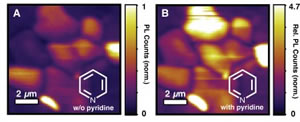Engineering a better solar cell: UW research pinpoints defects in popular perovskites
 One of the fastest-growing areas of solar energy research is with materials called perovskites. These promising light harvesters could revolutionize the solar and electronics industries because they show potential to convert sunlight into electricity more efficiently and less expensively than today’s silicon-based semiconductors.
One of the fastest-growing areas of solar energy research is with materials called perovskites. These promising light harvesters could revolutionize the solar and electronics industries because they show potential to convert sunlight into electricity more efficiently and less expensively than today’s silicon-based semiconductors.These superefficient crystal structures have taken the scientific community by storm in the past few years because they can be processed very inexpensively and can be used in applications ranging from solar cells to light-emitting diodes (LEDs) found in phones and computer monitors.
A new study published online April 30 in the journal Science by University of Washington and University of Oxford researchers demonstrates that perovskite materials, generally believed to be uniform in composition, actually contain flaws that can be engineered to improve solar devices even further. Cont'd...
Comments (0)
This post does not have any comments. Be the first to leave a comment below.
Featured Product

Vecoplan - Planning and implementation of complete processing plants in refuse derived fuel production
In order to reduce the costs involved in the energy-intensive production of cement, many manufacturers are turning to refuse-derived fuels (RDF), considerably reducing the proportion of expensive primary fuels they would normally use. Solid fuels are being increasingly used - these might be used tyres, waste wood or mixtures of plastics, paper, composite materials and textiles. Vecoplan provides operators of cement plants with proven and robust components for conveying the material and separating iron and impurities, efficient receiving stations, storage systems and, of course, efficient shredders for an output in various qualities.
